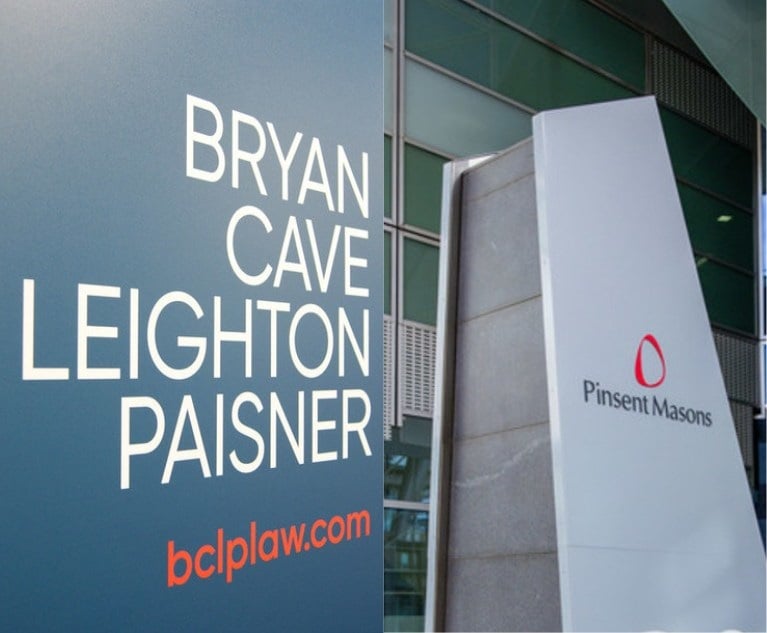Top firms land places on China Resources' first global panel
Baker & McKenzie, Herbert Smith Freehills and Hogan Lovells are among a raft of firms to have won spots on China Resources' first international legal panel. The state-owned conglomerate has appointed about 10 firms to the panel, although it would not confirm the exact number. The panel is subdivided into practice areas that include M&A and litigation. Other successful firms include King & Wood Mallesons, Davis Polk & Wardwell and Reed Smith, along with the magic circle quartet of Allen & Overy, Clifford Chance, Freshfields Bruckhaus Deringer and Slaughter and May. Between five and 10 firms have been allotted to each practice area, depending on demand.
October 24, 2013 at 07:03 PM
4 minute read
Bakers, HSF and Hogan Lovells join magic circle firms on roster
Baker & McKenzie, Herbert Smith Freehills and Hogan Lovells are among a raft of firms to have won spots on China Resources' first international legal panel.
The state-owned conglomerate has appointed about 10 firms to the panel, although it would not confirm the exact number. The panel is subdivided into practice areas that include M&A and litigation.
Other successful firms include King & Wood Mallesons, Davis Polk & Wardwell and Reed Smith, along with the magic circle quartet of Allen & Overy, Clifford Chance, Freshfields Bruckhaus Deringer and Slaughter and May. Between five and 10 firms have been allotted to each practice area, depending on demand.
The Hong Kong-headquartered company invited law firms to tender for places on its panel at the end of last year in a move to formalise the selection of external counsel and control the quality of legal advice.
Its domestic panel includes Beijing's AnJie Law Firm – a 12-partner spin-off from domestic outfits Zhong Lun, Grandall and Mingtai.
Like the majority of Chinese state-owned enterprises (SOEs), China Resources, which posted total turnover of HK$404.6bn (£33.8bn) in 2012 and ranked 233rd in last year's Fortune 500, had previously appointed legal advisers on an ad-hoc basis.
"Being selected for the panel is good because it is a big client and a big SOE," said one partner, who asked to remain anonymous. "But it is the first time they have done a panel, so it remains to be seen how this will change things.
"Generally speaking panels are good for companies because they allow the clients to develop relationships with the panel firms and it gives the firms an opportunity to understand the clients – which is why most Western companies have panels."
Reed Smith recently advised the company on its proposed joint venture with Tesco, fielding a team led by Hong Kong-based corporate partner Ivy Lai.
Last year Clifford Chance acted for subsidiary China Resources Gas Group on a $750m (£465m) bond issue, led by capital markets partner Matt Fairclough, also in Hong Kong.
China Resources would not comment on the panel review. However, in an interview with Legal Week in June, deputy general counsel Anthony Poon said appointments to the international panel were likely to last two years. He said the company would be prioritising expertise and existing relationships ahead of cost.
It is still relatively rare for Chinese SOEs to appoint Western-style panels, with most continuing to maintain an informal roster of firms they use regularly and which are appointed on an individual project or transaction basis.
Where Chinese corporates have put panels in place, partners say they will often select firms with which they have existing relationships and group firms by practice.
"[It is fairly typical for] some Chinese clients within their panels to classify different firms by way of expertise," said projects partner Liu Yue, head of the international practice at Beijing firm Jia Yuan Law Offices.
"If they are an existing Chinese client and they are happy with you then in principle it is no problem for you to be selected for the panel. When they organise the bidding for the panel they have already determined that you should be bidding for it because they are happy with you. But there is a limited number of seats on the panel. Sometimes they will go off-panel where firms have specific expertise."
Click here to sign up for Legal Week's Asia Newsletter.
- Related event: Corporate Governance & Risk Forum 2013
This content has been archived. It is available through our partners, LexisNexis® and Bloomberg Law.
To view this content, please continue to their sites.
Not a Lexis Subscriber?
Subscribe Now
Not a Bloomberg Law Subscriber?
Subscribe Now
NOT FOR REPRINT
© 2025 ALM Global, LLC, All Rights Reserved. Request academic re-use from www.copyright.com. All other uses, submit a request to [email protected]. For more information visit Asset & Logo Licensing.
You Might Like
View All
A&O Shearman, Cleary Gottlieb Act on $700M Dunlop Tire Brand Sale to Japan's Sumitomo



Stewarts and DAC Beachcroft Lead on £2B Leicester City Helicopter Crash Litigation
Trending Stories
- 1'It's Not Going to Be Pretty': PayPal, Capital One Face Novel Class Actions Over 'Poaching' Commissions Owed Influencers
- 211th Circuit Rejects Trump's Emergency Request as DOJ Prepares to Release Special Counsel's Final Report
- 3Supreme Court Takes Up Challenge to ACA Task Force
- 4'Tragedy of Unspeakable Proportions:' Could Edison, DWP, Face Lawsuits Over LA Wildfires?
- 5Meta Pulls Plug on DEI Programs
Who Got The Work
Michael G. Bongiorno, Andrew Scott Dulberg and Elizabeth E. Driscoll from Wilmer Cutler Pickering Hale and Dorr have stepped in to represent Symbotic Inc., an A.I.-enabled technology platform that focuses on increasing supply chain efficiency, and other defendants in a pending shareholder derivative lawsuit. The case, filed Oct. 2 in Massachusetts District Court by the Brown Law Firm on behalf of Stephen Austen, accuses certain officers and directors of misleading investors in regard to Symbotic's potential for margin growth by failing to disclose that the company was not equipped to timely deploy its systems or manage expenses through project delays. The case, assigned to U.S. District Judge Nathaniel M. Gorton, is 1:24-cv-12522, Austen v. Cohen et al.
Who Got The Work
Edmund Polubinski and Marie Killmond of Davis Polk & Wardwell have entered appearances for data platform software development company MongoDB and other defendants in a pending shareholder derivative lawsuit. The action, filed Oct. 7 in New York Southern District Court by the Brown Law Firm, accuses the company's directors and/or officers of falsely expressing confidence in the company’s restructuring of its sales incentive plan and downplaying the severity of decreases in its upfront commitments. The case is 1:24-cv-07594, Roy v. Ittycheria et al.
Who Got The Work
Amy O. Bruchs and Kurt F. Ellison of Michael Best & Friedrich have entered appearances for Epic Systems Corp. in a pending employment discrimination lawsuit. The suit was filed Sept. 7 in Wisconsin Western District Court by Levine Eisberner LLC and Siri & Glimstad on behalf of a project manager who claims that he was wrongfully terminated after applying for a religious exemption to the defendant's COVID-19 vaccine mandate. The case, assigned to U.S. Magistrate Judge Anita Marie Boor, is 3:24-cv-00630, Secker, Nathan v. Epic Systems Corporation.
Who Got The Work
David X. Sullivan, Thomas J. Finn and Gregory A. Hall from McCarter & English have entered appearances for Sunrun Installation Services in a pending civil rights lawsuit. The complaint was filed Sept. 4 in Connecticut District Court by attorney Robert M. Berke on behalf of former employee George Edward Steins, who was arrested and charged with employing an unregistered home improvement salesperson. The complaint alleges that had Sunrun informed the Connecticut Department of Consumer Protection that the plaintiff's employment had ended in 2017 and that he no longer held Sunrun's home improvement contractor license, he would not have been hit with charges, which were dismissed in May 2024. The case, assigned to U.S. District Judge Jeffrey A. Meyer, is 3:24-cv-01423, Steins v. Sunrun, Inc. et al.
Who Got The Work
Greenberg Traurig shareholder Joshua L. Raskin has entered an appearance for boohoo.com UK Ltd. in a pending patent infringement lawsuit. The suit, filed Sept. 3 in Texas Eastern District Court by Rozier Hardt McDonough on behalf of Alto Dynamics, asserts five patents related to an online shopping platform. The case, assigned to U.S. District Judge Rodney Gilstrap, is 2:24-cv-00719, Alto Dynamics, LLC v. boohoo.com UK Limited.
Featured Firms
Law Offices of Gary Martin Hays & Associates, P.C.
(470) 294-1674
Law Offices of Mark E. Salomone
(857) 444-6468
Smith & Hassler
(713) 739-1250








